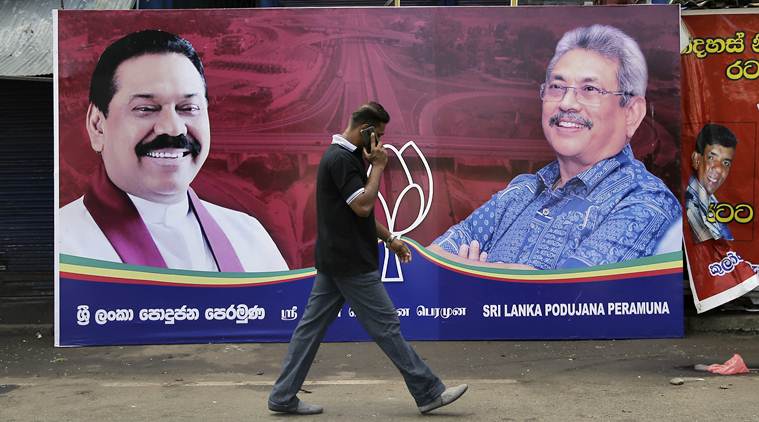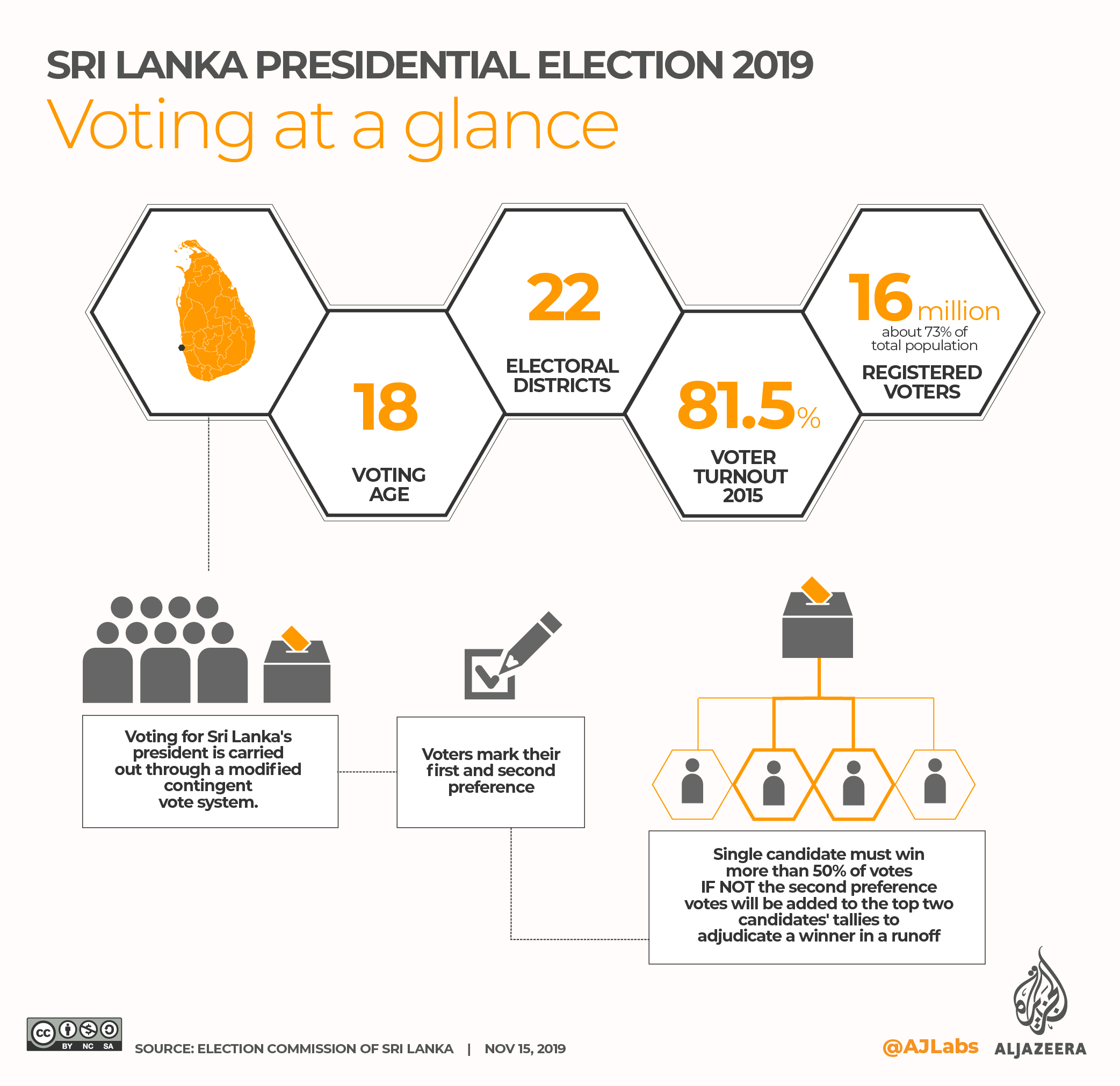Gotabaya Rajapaksa, a former defence minister and brother of two-time former presid – Sri Lankans ent Mahinda Rajapaksa, and Sajith Premadasa, the ruling United National Party’s (UNP) candidate, are the top two contenders in a poll that has a record 35 candidates vying to lead Sri Lanka’s government.
Polls opened at 7:00am local time (01:30 GMT) on Saturday and closed at 5:00pm (11:30 GMT). Some 15.9 million Sri Lankans were eligible to vote at 12,845 polling stations in the country’s 22 electoral districts, according to the Election Commission. Final results are expected by Sunday.
As of midday, election observers reported sporadic cases of limited violence and electoral violations, including two cases of assault and 41 of intimidation.
Early on Saturday, unidentified gunmen opened fire on a convoy of more than a 100 buses carrying voters – mainly Muslims – at Thanthirimale, about 240km (150 miles) north of Colombo, election observers said.
“Unidentified groups shot at and pelted stones at the buses,” said Manjula Gajanayake, the national coordinator for the Colombo-based Centre for Monitoring Election Violence (CMEV).
At a press conference later on Saturday, police spokesperson Nuwan Gunasekara said there were no casualties in the attack, which damaged three buses. He added that no arrests were made but local police had opened an investigation.
In all, the spokesperson said 26 people were arrested across the country on Saturday; eight for taking pictures with mobile phones inside polling stations and 18 for other electoral law violations.
Divisive campaign
Historically, voter turnout for presidential elections has been high, with more than 81.5 percent of voters casting their ballots in the last election in 2015.
Outgoing President Maithripala Sirisena, who won that vote, will not be seeking re-election, but his Sri Lanka Freedom Party (SLFP) is backing Rajapaksa.
Prime Minister Ranil Wickremesinghe, who Sirisena unsuccessfully attempted to remove in October last year, is backing his own party’s candidate, Premadasa.
The six-week campaign divided the country, with Rajapaksa promising to bring in strong, centralised leadership to tackle security, boasting of his credentials of being the defence minister who presided over the end of Sri Lanka’s 26-year war with Tamil rebels.
Rights group have long called for accountability for allegations of enforced disappearances, extrajudicial killings and other violations allegedly committed during that tenure.
According to a United Nations report, as many as 40,000 Tamils may have been killed in the final months of the war.
Mahinda Rajapaksa, who Gotabaya says he will name prime minister if he is elected, has also been accusedof widespread rights abuses aimed at silencing dissent during his previous two terms in power.
Voices at polling stations
Voters formed orderly lines outside polling stations across Colombo as voting opened on Saturday.
Leslie Rajakaruna, 78, a retired railways officer, said he was voting for Gotabaya Rajapaksa because he was “a strong leader”.
“There is too much foreign involvement, Sri Lanka should control itself,” he said, alleging interference in the country’s domestic policies by “the United States, European countries and the United Nations”.
Rajakaruna dismissed allegations of war crimes against the Rajapaksa’s as being politically motivated.
“They will not be able to prove a single abduction, it’s all fake,” he said.
Poulasingham Sridarasingh, 67, a Tamil bookstore owner, said he was voting but did not hold any expectations for things to get better for his ethnic community.
“We have a right to vote, but we [Tamil people] are not getting anything out of it,” he said.
Sandya Kumari, 59, a cleaner in Colombo’s Wellawatte area, said she was voting for the UNP’s Sajith Premadasa because “he thinks about poor people”.
Premadasa’s campaign has focused on lower income groups, promising government-subsidised housing, more jobs and other benefits.
Pathinagodage Rajith, a mason, said he was voting for Gotabaya Rajapaksa because he believed in his economic programme.
“Economic issues are our biggest concern. Whatever we earn we have to spend,” said the 57-year-old, who earns roughly 30,000 Sri Lankan rupees ($166) a month.
Read Also: Trump Open To Deal With Democrats Over Obama’s DACA Project
Imran Muhammad Ali, 38, works in the IT sector, and said he was voting against Gotabaya Rajapaksa because of the allegations of rights violations during his brother’s term in office.
For voters, the election comes as economic growth is slated to slow to 2.7 percent this year, according to the IMF, and security has become a major issue following the Easter Sunday suicide attacks that killed at least 269 people.
“The cost of living and the state of the economy, these are our biggest issues,” said Shriyani Gamage, 56, a homemaker in capital Colombo. “We don’t have enough money … this country has gone to the dogs.”
Analysts say there is little to choose between the candidates’ economic policies.
“It’s a form of crude mercantilism where the rich in Colombo can prosper but the middle class will also feel squeezed out,” said Kumaradivel Guruparan, an academic in the northern city of Jaffna. “It is crude capitalism that is then sprinkled with here-and-there policies inspired by welfare economics or socialism.”



